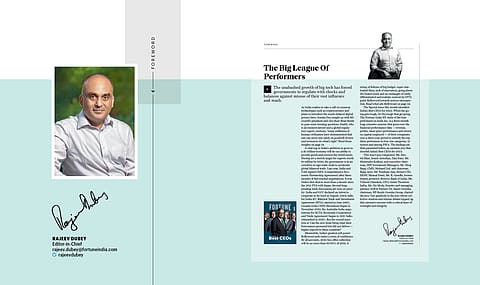The Big League of Performers
The Fortune India-EY study of the best performers in India Inc. pores over the financial performance of the firms over a 3-year period to identify the top three performers in different categories.

This story belongs to the Fortune India Magazine October 2022 issue.
The unabashed growth of big tech has forced governments to regulate with checks and balances against misuse of their vast influence and reach.
As India readies to take a call on runaway technologies such as cryptocurrency and plans to introduce the much-delayed digital privacy laws, Asmita Dey caught up with Microsoft’s president and vice chair Brad Smith to pose some burning questions. Smith, who is an eminent lawyer and a global regulatory expert, cautions, “many millennia of human civilisation have demonstrated that one can never rely solely on goodwill of men and women to do what’s right”. Read our story “The Conversation” to get more insight on this.
A vital cog in India’s ambition to grow to a $5-trillion economy will be our ability to provide goods and services the world needs. Having set a stretch target for exports worth $1 trillion by 2030, the government is in an overdrive to sign trade deals to accelerate global bilateral trade. Last year, India and UAE signed CEPA (Comprehensive Economic Partnership Agreement) after three months of fast-tracked negotiations. It was India’s first deal in more than a decade since the 2011 FTA with Japan. Several long-pending trade discussions are now on priority: India and GCC declared an intent to cooperate as far back as August 2004; talks for India-EU Bilateral Trade and Investment Agreement (BTIA) started in June 2007; Canada-India CEPA discussions began in November 2010; the Australia-India negotiations for ECTA (Economic Cooperation and Trade Agreement) began in 2011 (talks relaunched in 2021). But the crucial question is: Can the new deals bring what their forerunners promised but did not deliver — higher exports to these countries?
Meanwhile, India’s greatest soft power Bollywood reels under a crisis of confidence. By all accounts, 2022 box-office collection will be no more than 60-65% of 2019. A string of failures of big budget, super star-loaded films, lack of innovation, going about the beaten track and an onslaught of vastly differentiated and realistic content by OTTs point Bollywood towards serious introspection. Read what ails Bollywood in our story "What Ails Bollywood".
The Special Issue this month identifies India’s Best CEOs for 2022. When the going gets tough, it’s the tough that get going. The Fortune India-EY study of the best performers in India Inc. is a three-month long extensive exercise that pores over the financial performance data — revenue, profits, share price performance and return on capital employed — of their companies over a three-year period to identify the top three performers in four size categories, 12 sectors and among PSUs. The findings are then presented before an eminent jury that decided India’s Best CEOs for 2022.
This year’s jury comprised: Mr. Harish Bhat, brand custodian, Tata Sons; Mr. Hemendra Kothari, non-executive chairman, DSP Investment Managers; Mr. Niraj Bajaj, CMD, Mukand Ltd. and chairman, Bajaj Auto; Mr. Prashant Jain, former CIO, HDFC Mutual Fund; Mr. R. Gandhi, former deputy governor, Reserve Bank of India; Mr. Vishesh Chandiok, CEO, Grant Thornton India; Ms. Zia Mody, founder and managing partner, AZB & Partner. Dr. Sanjiv Goenka, chairman, RP-Sanjiv Goenka Group, chaired the jury. Our gratitude to the jury whose collective wisdom and intense debate topped up this extensive exercise with a critical layer of oversight and integrity.